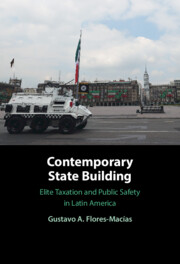Refine search
Actions for selected content:
9 results
Fertilizer for Victory: The Chilean–US Nitrate Trade in the Second World War
-
- Journal:
- Business History Review / Volume 98 / Issue 3 / Autumn 2024
- Published online by Cambridge University Press:
- 17 January 2025, pp. 685-725
- Print publication:
- Autumn 2024
-
- Article
- Export citation

Contemporary State Building
- Elite Taxation and Public Safety in Latin America
-
- Published online:
- 02 June 2022
- Print publication:
- 09 June 2022
3 - Economic Competition, Weak Parties, and Businessperson Candidacy
-
- Book:
- Politics for Profit
- Published online:
- 15 June 2020
- Print publication:
- 09 July 2020, pp 101-135
-
- Chapter
- Export citation
2 - Identifying Businesspeople Who Run for Office
-
- Book:
- Politics for Profit
- Published online:
- 15 June 2020
- Print publication:
- 09 July 2020, pp 79-100
-
- Chapter
- Export citation
5 - Firm-Level Returns from Businessperson Candidacy
-
- Book:
- Politics for Profit
- Published online:
- 15 June 2020
- Print publication:
- 09 July 2020, pp 180-209
-
- Chapter
- Export citation
6 - Businesspeople as Policymakers
-
- Book:
- Politics for Profit
- Published online:
- 15 June 2020
- Print publication:
- 09 July 2020, pp 210-240
-
- Chapter
- Export citation
1 - A Theory of Businessperson Candidacy
-
- Book:
- Politics for Profit
- Published online:
- 15 June 2020
- Print publication:
- 09 July 2020, pp 30-78
-
- Chapter
- Export citation
7 - Conclusion and Policy Recommendations
-
- Book:
- Politics for Profit
- Published online:
- 15 June 2020
- Print publication:
- 09 July 2020, pp 241-258
-
- Chapter
- Export citation
Introduction
-
- Book:
- Politics for Profit
- Published online:
- 15 June 2020
- Print publication:
- 09 July 2020, pp 1-29
-
- Chapter
- Export citation
